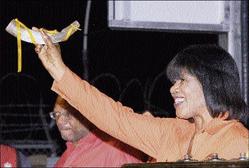
People's National Party (PNP) president Portia Simpson Miller holds aloft an abeng, a symbolic instrument of the Maroons, at a PNP mass rally at Portia Simpson Miller Square, St. Andrew, on the campaign trail. - Colin Hamilton/Freelance Photographer Accompong Maroons in St. Elizabeth say that a series of unfortunate events that have befallen the People's National Party (PNP), including their loss in the recent general election, was due to the use of the sacred abeng at some of their rallies.
They claim that the instrument, which is made from the horn of a cow, is used for 'war-summoning', as well as to invoke the spirits of their ancestors.
"The abeng should not be used in any political system. When it is used for this political purpose, serious things will happen. The abeng is our national symbol. I believe the ancestors stirred in their graves to see this happening. The Maroons cannot be political. The abeng was tarnished because it was used in a political manner. It has spiritual powers," said Melville Currie, deputy colonel responsible for culture and tourism at Accompong.
Held abeng aloft at rallies
The PNP's president had held the abeng aloft during several of her presentations, including the party's mass rally at the Portia Simpson Miller Square in St. Andrew on August 7. She also brought the instrument to the nomination centre in her constituency, South West St. Andrew, on nomination day.
The unfortunate events which have happened to the former Prime Minister and persons in her circle began on July 22 when Corporal Randolph Mullings, a member of her security team, was arrested after being caught driving a stolen vehicle. He was slapped with four charges in relation to the incident.
After the party lost the general election on September 3, Portia's bodyguard, Det. Sgt. Everton Brown, was killed and his firearm stolen four days later. The following day, Maurice West, who had worked as a 'runner' in her constituency on election day, was shot and killed.
The instrument had actually been given to the former Prime Minister by the Accompong Maroons. But following the presentation, there was said to have been heated arguments in the community about whether that should have been done. The squabble is said to have caused a rift in their society for some time.
One Maroon, Colonel Sidney Peddy, said that while the abeng is used to invoke spirits, he did not see a problem in giving it to the former Prime Minister.
Currie, on the other hand, said that he believed that his Maroon ancestors were 'cut up' over the decision. He added that the abeng was not only a war-sounding instrument but a sacred and very dangerous artefact.
"Nuff man get hurt, nuff man get sick and dead. Yuh cyaa blow it without rum. When yuh can blow it, yuh affi open a new flask a rum and wash it out, and den blow it again. Mi nuh think dem follow dem rules deh man," he said.
When THE STAR yesterday spoke to Professor Ashley Smith, Cultural Studies lecturer at the University of the West Indies, he said that he does not believe that 'wrongful' use of the abeng can result in destruction.
"... A lot of things happen to us and it's not because they are reality but because we make them reality. That's what superstition is about," the professor said.
Only one Abeng available
He added: "I worked among the Maroons during 1955 to 1960 and what I heard was that there was only one abeng at a time and that it's always in the custody of the leader. So, something can be a replica, but not the actual abeng. The abeng is revered and they only use it in significant times in their history and to call the community together, for instance, if a death occurred or if they wanted to address the community about an issue that was decided by the central government that is related to them."
Both the general secretary and the deputy general secretary of the PNP, Donald Buchanan and Julian Robinson, respectively, denied knowledge of the abeng being a part of the PNP's campaign.
"... I know that the party president received an abeng, but it was never a tool in the campaign," Buchanan said.
The preceding story was taken from yesterday's edition of The Star.

